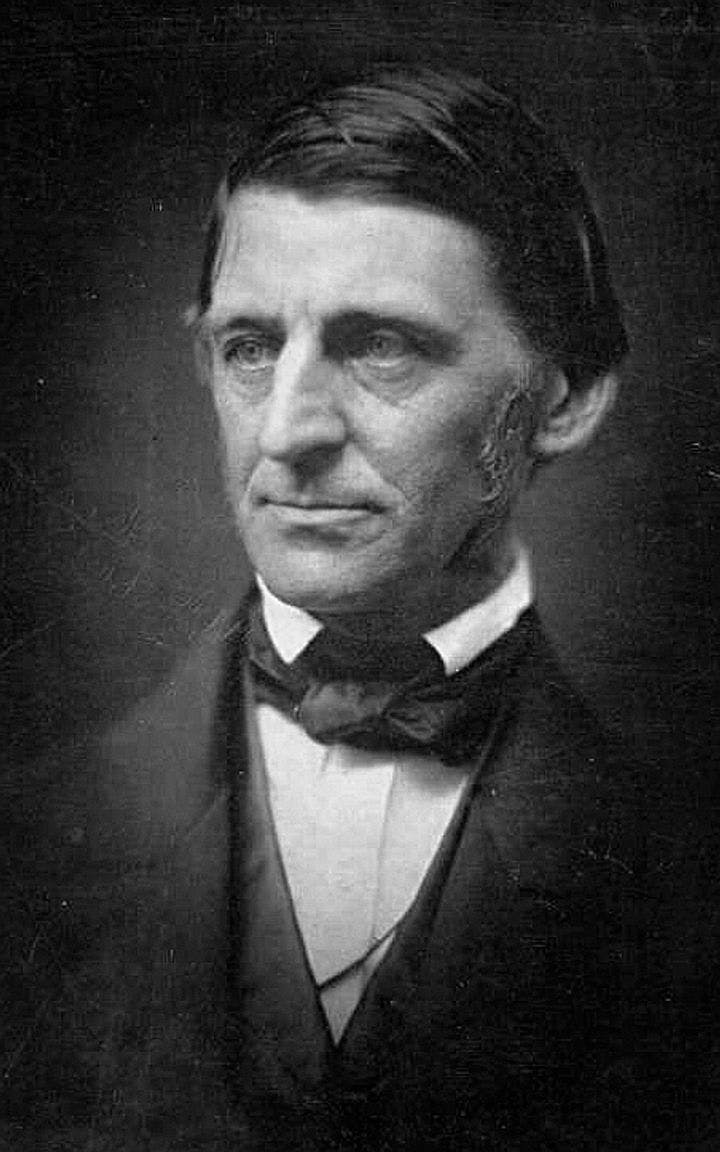Spring 2010
Intellectual Horsepower
– Nikolai Slivka
Ralph Waldo Emerson, one of the best and most prolific authors of 19th-century America, believed that too much reading stifled the creative impulse. Why?
“Stop if you find yourself becoming absorbed, at even the first paragraph.” So advised Ralph Waldo Emerson on the perils of reading. As Robert D. Richardson eloquently shows in First We Read, Then We Write, this admonition is of a piece with Emerson’s awareness, articulated in mordant comments throughout his life, that while reading is essential to good writing, it also insistently threatens to subdue the creative impulse. “Each of the books I read invades me, displaces me,” he once complained.
The author of Nature (1836) and such seminal essays as “The American Scholar” and “Self-Reliance,” Emerson (1803–82) believed that reading should be a vigorous culling of facts and ideas, directly in the service of one’s own intellectual production. Too often, he observed, we read as sluggards, “drugged with books.” Thus, he encouraged what we would call speed-reading: Turn “page after page, keeping your writer’s thought before you, but not tarrying with him, until he has brought you the thing you are in search of.” Most important, don’t forget that “you only read to start your own team.”
The comparison is between a team of horses getting under way and the mysterious process by which external stimulation leads to original work. In his comprehensive 1995 biography Emerson: The Mind on Fire, Richardson portrayed a thinker fascinated by this process. Shaken by the skepticism of 18th- century philosopher David Hume, Emerson was animated by the question of what independent creative force an individual could unassailably lay claim to: “My heart’s inquiry is, whence is your power?” In the narrower ambit of First We Read, Then We Write, Richardson focuses on the practical dimension of literary creation, devoting chapters to Emerson’s reading, word choice, attitude toward his audience, and sentence construction.
Richardson takes particular note of what he calls Emerson’s “makeshifts” and “strategies.” His central writing strategy was to keep journals, then draw from them whenever a project arose. Richardson claims that Emerson’s “Rousseau- like belief that we are born not just good, but open— to the world and to others—led him to prize hints, glimmers, premonitions.” The journals proved an apt vehicle not only for these wisps of thought, but also for the weightier cargo of fully developed prose that Emerson would later copy into his lecture manuscripts.
The journals’ practical value depended on the elaborate index to which Emerson yoked them. Begun in 1838, within 10 years the master index was 400 pages long. The biographical listings numbered 839 names, and some entries—“Intellect,” for instance—might include 100 references, each encapsulated in a few phrases and pegged to the page and volume containing the full passage. Emerson relied so heavily on his journals that he came to refer to them as his “savings bank.”
Despite the journals, writing was a struggle. According to Richardson, in his creative life Emerson endured “cramp . . . , utter inglorious collapse, and the terrible power of mere mood.” In his journal, he evokes the distress of a writer who at the end of a fruitless day must face loved ones and “return to the necessities and conversation of the household without the support of any product, and they must believe you and you may doubt that this waste can be justified.” From this desolate scene, Emerson leaps to an optimism that Richardson rightly criticizes as forced and “formulaic”: “The Saharas must be crossed as well as the Nile”; from “your absence of thought” comes a “purer splendor,” and so forth.
The Emerson of First We Read, Then We Write inspires not through exhortation but by example. Richardson has beautifully educed how creativity springs from habit, self-awareness, the timely journal entry, the right book judiciously set aside.
* * *
Nikolai Slivka is a freelance writer living in Palo Alto, California.
Reviewed: "First We Read, Then We Write: Emerson on the Creative Process" by Robert D. Richardson, University of Iowa Press, 2010.
Photo courtesy of Wikimedia Commons
